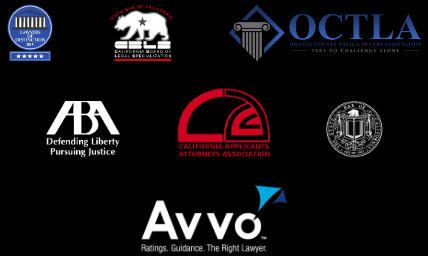The Workers’ Compensation system plays a crucial and necessary role in safeguarding the rights and well-being of employees injured on the job in the state of California. However, there are situations where the California Worker’s Compensation system faces unique challenges.
Two critical scenarios involve injured workers whose employers do not carry workers’ compensation insurance and those who are misclassified as 1099 independent contractors instead of W-2 employees.
Understanding the options available to injured workers, such as the Uninsured Employers Benefits Trust Fund and other legal remedies, is crucial for securing compensation and medical care owed to the injured worker under the California State Workers Compensation system.
Enlisting the help of a confident Long Beach work comp lawyer plays a pivotal role in ensuring that injured workers’ rights are protected and that they receive the benefits they deserve, regardless of their employer’s compliance or misclassification.

Uninsured Employers and the Uninsured Employers Benefits Trust Fund (UEBTF)
In California, employers are legally required to provide workers’ compensation insurance to protect their employees in the event of work-related injuries or illnesses. Unfortunately, not all employers comply with this mandate, leaving workers vulnerable. The challenges posed by uninsured employers include:
- Lack of Financial Safety Net: Uninsured employers may fail to provide injured workers with the necessary medical care and wage replacement benefits.
- Potential for Legal Action: Injured workers may need to explore legal avenues, such as civil lawsuits, to obtain compensation when their employers lack insurance coverage.
- Potential Fines: If an employer is found to not have Worker’s Compensation, they are subject to audit by the Department of Worker’s Compensation. If they have not had insurance for several years, they will be charged for backdated premiums and, in many cases, these penalties are so stiff they will put businesses out of business.
The Role of the Uninsured Employers Benefits Trust Fund (UEBTF)
To address the challenges posed by uninsured employers, California established the Uninsured Employers Benefits Trust Fund (UEBTF). We will point out some key points of this program to understand what it includes:
- Safety Net for Injured Workers: The UEBTF serves as a safety net for injured workers whose employers do not carry workers’ compensation insurance. Injured workers can file claims with the UEBTF to receive medical treatment and wage replacement benefits.
- Funding Mechanism: The UEBTF is funded through penalties assessed against uninsured employers. These penalties can be significant, serving as a deterrent to employers who might consider going without insurance. Employers will be liable for every penny spent on the injured worker’s health, potentially ongoing health care, and financial settlement.
- Complex Claims Process: Navigating the UEBTF claims process can be complex. Injured workers often require legal representation to ensure they receive the benefits they deserve. Unfortunately, very few lawyers handle UEBTF claims since it takes so long to get paid. However, finding a California Worker’s Compensation lawyer to handle an unemployed insurance benefits trust fund claim is possible. It just may take some time to call around to find the right firm for you.
Legal Remedies for Injured Workers
Injured workers facing uninsured employers have legal remedies to secure compensation:
- UEBTF Claims: Injured workers can file claims with the UEBTF, which can provide benefits for medical treatment and wage replacement. The state also provides UEBTF applicant lawyers to assist the injured workers in recovering the money necessary to pay for medical treatment and any permanent disability settlements.
- Civil Lawsuits: In some cases, injured workers may pursue civil lawsuits against their employers to seek compensation for their injuries. However, this is a very challenging and time-consuming process and, in many cases, the employers could go bankrupt, leaving the injured worker with nothing to gain financially from the civil lawsuit.
Employee Misclassification as 1099 Workers
Employee misclassification occurs when workers are designated as 1099 independent contractors rather than W-2 employees, often to avoid certain legal obligations, such as providing workers’ compensation coverage. Challenges injured workers may face by being a misclassified employee include:
- Lack of Workers’ Compensation Coverage: Misclassified workers are typically not covered by their employers’ workers’ compensation insurance policies. In this case, it would be up to the state or the IRS to decide on the status of the injured workers. If they are misclassified and are not 1099 contractors, they would then be eligible to take advantage of the UEBTF, just like an injured worker who suffered injuries on the job and their employer had no workers’ compensation insurance.
- Reduced Employment Protections: Misclassified workers may have limited access to employment benefits, such as minimum wage, overtime, and protection against wrongful termination. Again, if the state or IRS (or both) find that the injured worker was misclassified and should have been paid as a W-2 employee, they will force the employer to remedy the situation. This includes providing medical care and a financial settlement out of the employer’s pocket.
Legal Determinations of Misclassification
The determination of employment status (i.e. whether someone is a W-2 employee or a 1099 independent contractor) is complex and involves considering multiple factors, such as:
- Control: The degree of control an employer exercises over a worker’s tasks, hours, and working conditions. Many employers in California, do their best to bend the rules, but these are very straightforward provisions. So much so, in fact, that in 9 out of 10 cases, the employer is found wrong, and the employee is owed worker’s compensation benefits.
- Payment Method: Whether a worker is paid on an hourly or project basis, they’re eligible to receive employee benefits or reimbursement for incurred business expenses.
- Nature of the Work Relationship: The extent to which a worker’s services are integral to the employer’s business and whether the work is temporary or ongoing.
Correcting Misclassification
When misclassification is identified, injured workers have avenues to correct it and access workers’ compensation benefits:
- Reclassification: Workers can seek reclassification as W-2 employees through legal channels, which may involve notifying the employer and relevant authorities. This is something that an injured worker’s tax preparer or CPA would handle for them. However, this would not exonerate the employer from paying medical bills and any financial settlements the injured worker may have incurred due to their work injury
- Access to Workers’ Compensation: Once reclassified, workers become eligible for workers’ compensation benefits, including medical treatment and wage replacement. Again, this does not exonerate the employer from any penalties or fees from the state.
- Legal Representation: Legal counsel is often essential when pursuing reclassification and workers’ compensation claims. A misclassified injured worker working as a 1099 employee when they should be a W-2 employee, would not cost the injured worker money for legal representation. They would need to report their employer to the state and/or the IRS to make the determination. At that point, the employer would go through the process of being fined and having to come up with the money out of their own pocket to handle the injured worker’s injuries and any financial settlement that is owed to them.
The Importance of Legal Counsel
Navigating the complexities of workers’ compensation, especially when dealing with uninsured employers or misclassification, requires legal expertise. Legal counsel can assist injured workers in understanding their rights, securing benefits, and pursuing legal remedies when necessary.

Protecting Injured Workers’ Rights
Legal representation plays a vital role in protecting the rights and interests of injured workers:
- Advocacy: Attorneys advocate on behalf of injured workers to ensure they receive appropriate medical care, wage replacement, and other benefits.
- Negotiation: Lawyers can negotiate with insurance companies, employers, and relevant authorities to secure the best possible outcomes for injured workers.
- Litigation: In cases of disputes or denials of benefits, attorneys can initiate legal action to protect the rights of injured workers.
Who’s the leading Long Beach work comp lawyer near me?
If you have been misclassified as a 1099 employee or you have been injured on the job and your employer does not carry insurance, enlisting the aid of the California Workers Compensation Lawyers is exactly what you need to ensure your legal rights are protected.
Our extensive experience in the field and profound knowledge of the work comp system can tip the balance of scales in your favor, giving you the best chance of realizing your claim and acquiring the benefits you’re entitled to. Contact our offices in Long Beach today for a free consultation!








